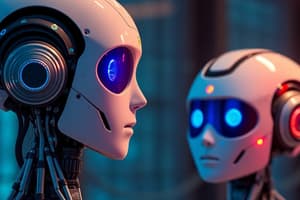Podcast
Questions and Answers
What are the two main components that define how an agent interacts with its environment?
What are the two main components that define how an agent interacts with its environment?
- Feedback Systems and Sensors
- Controllers and Sensors
- Actuators and Controllers
- Actuators and Sensors (correct)
Which of the following best defines a softbot?
Which of the following best defines a softbot?
- A hardware device that acts as a controller
- An electronic sensor used in robotics
- A feedback control system
- A software program that runs on a host device (correct)
What does the agent function do?
What does the agent function do?
- Maps the actions to the environment variables
- Maps percept sequences to actions (correct)
- Evaluates the performance of an intelligent agent
- Regulates processes to a desired state
In control theory, what term refers to a system that automatically regulates a process variable?
In control theory, what term refers to a system that automatically regulates a process variable?
Which of the following statements is NOT true about intelligent agents?
Which of the following statements is NOT true about intelligent agents?
What does a utility-based agent primarily evaluate to make decisions?
What does a utility-based agent primarily evaluate to make decisions?
What is the performance measure used by a utility-based agent?
What is the performance measure used by a utility-based agent?
In the context of planning, what is meant by the 'sum of the cost of a planned sequence of actions'?
In the context of planning, what is meant by the 'sum of the cost of a planned sequence of actions'?
What is the role of the variable 'a' in the expression involving 'argmin'?
What is the role of the variable 'a' in the expression involving 'argmin'?
What does the example of solving a puzzle illustrate in the context of interactions?
What does the example of solving a puzzle illustrate in the context of interactions?
What components make up an agent according to the defined architecture?
What components make up an agent according to the defined architecture?
In the Vacuum-cleaner World, what action does the agent take when it perceives its status as dirty?
In the Vacuum-cleaner World, what action does the agent take when it perceives its status as dirty?
What does the performance measure for an agent provide?
What does the performance measure for an agent provide?
What type of agents should select actions based on maximizing expected performance measures?
What type of agents should select actions based on maximizing expected performance measures?
What does 'Consequentialism' in the context of rational agents evaluate?
What does 'Consequentialism' in the context of rational agents evaluate?
In the agent function example provided, what action is returned when the agent is in location A and the status is Clean?
In the agent function example provided, what action is returned when the agent is in location A and the status is Clean?
What is the term used for the function that calculates the behavior of a rational agent based on its perception?
What is the term used for the function that calculates the behavior of a rational agent based on its perception?
What is expected outcome in the context of rational agents?
What is expected outcome in the context of rational agents?
What triggers the operation of an old-school thermostat?
What triggers the operation of an old-school thermostat?
Which statement best describes a goal-based agent?
Which statement best describes a goal-based agent?
What performance measure is used to evaluate the effectiveness of an agent?
What performance measure is used to evaluate the effectiveness of an agent?
How does a smart thermostat adjust to changing environmental factors?
How does a smart thermostat adjust to changing environmental factors?
In what scenario would the bi-metal spring thermostat change its temperature setting?
In what scenario would the bi-metal spring thermostat change its temperature setting?
Which factor does NOT influence a smart thermostat's decision-making?
Which factor does NOT influence a smart thermostat's decision-making?
What distinguishes a planning agent from regular goal-based agents?
What distinguishes a planning agent from regular goal-based agents?
Which aspect is NOT part of the agent's percepts when determining temperature adjustments?
Which aspect is NOT part of the agent's percepts when determining temperature adjustments?
What characteristic defines a static environment?
What characteristic defines a static environment?
Which of the following is an example of a dynamic environment?
Which of the following is an example of a dynamic environment?
In which type of environment does an agent's choice in one episode affect subsequent episodes?
In which type of environment does an agent's choice in one episode affect subsequent episodes?
What feature distinguishes continuous environments from discrete environments?
What feature distinguishes continuous environments from discrete environments?
Which type of environment is characterized by partially observable states?
Which type of environment is characterized by partially observable states?
What type of agent operates in an environment without cooperation or competition?
What type of agent operates in an environment without cooperation or competition?
Which characteristic is true of a semidynamic environment?
Which characteristic is true of a semidynamic environment?
Which of the following best describes a stochastic game?
Which of the following best describes a stochastic game?
What does the function $𝑎=arg𝑚𝑎𝑥 𝑎 ∈ A 𝔼$ indicate in the context of reinforcement learning?
What does the function $𝑎=arg𝑚𝑎𝑥 𝑎 ∈ A 𝔼$ indicate in the context of reinforcement learning?
In the context of agents that learn, what is the primary function of the learning element?
In the context of agents that learn, what is the primary function of the learning element?
Which of the following features is NOT typically included in modern robot vacuums?
Which of the following features is NOT typically included in modern robot vacuums?
What is represented by the acronym PEAS in robotic design?
What is represented by the acronym PEAS in robotic design?
In reinforcement learning, what does expected future discounted reward mean?
In reinforcement learning, what does expected future discounted reward mean?
What factor does a modern vacuum robot NOT typically measure?
What factor does a modern vacuum robot NOT typically measure?
What is the role of the performance element in an agent?
What is the role of the performance element in an agent?
Which aspect of an autonomous Mars rover's performance is prioritized?
Which aspect of an autonomous Mars rover's performance is prioritized?
Flashcards
Intelligent Agent
Intelligent Agent
Anything that perceives its environment through sensors and acts upon it through actuators.
Agent Function
Agent Function
A mathematical function that maps sensor inputs (percepts) to actions.
Agent Program
Agent Program
A specific implementation of the agent function for a particular system.
PEAS
PEAS
Signup and view all the flashcards
Rationality
Rationality
Signup and view all the flashcards
Agent
Agent
Signup and view all the flashcards
Rational Agent
Rational Agent
Signup and view all the flashcards
Percept Sequence
Percept Sequence
Signup and view all the flashcards
Performance Measure
Performance Measure
Signup and view all the flashcards
Consequentialism
Consequentialism
Signup and view all the flashcards
Environment Types
Environment Types
Signup and view all the flashcards
Known vs. Unknown
Known vs. Unknown
Signup and view all the flashcards
Static vs. Dynamic
Static vs. Dynamic
Signup and view all the flashcards
Semidynamic Environments
Semidynamic Environments
Signup and view all the flashcards
Discrete vs. Continuous
Discrete vs. Continuous
Signup and view all the flashcards
Episodic vs. Sequential
Episodic vs. Sequential
Signup and view all the flashcards
Single Agent vs. Multi-Agent
Single Agent vs. Multi-Agent
Signup and view all the flashcards
Observable vs. Partially Observable
Observable vs. Partially Observable
Signup and view all the flashcards
Goal-Based Agent
Goal-Based Agent
Signup and view all the flashcards
Planning Agent
Planning Agent
Signup and view all the flashcards
Percepts
Percepts
Signup and view all the flashcards
States
States
Signup and view all the flashcards
Actuators
Actuators
Signup and view all the flashcards
Smart Thermostat
Smart Thermostat
Signup and view all the flashcards
Bi-metal Spring
Bi-metal Spring
Signup and view all the flashcards
Utility-based Agent
Utility-based Agent
Signup and view all the flashcards
Utility Function
Utility Function
Signup and view all the flashcards
Reward
Reward
Signup and view all the flashcards
Discounted Sum of Expected Utility
Discounted Sum of Expected Utility
Signup and view all the flashcards
Expected Future Discounted Reward
Expected Future Discounted Reward
Signup and view all the flashcards
Modern Robot Vacuum: Performance
Modern Robot Vacuum: Performance
Signup and view all the flashcards
Modern Robot Vacuum: Environment
Modern Robot Vacuum: Environment
Signup and view all the flashcards
Modern Robot Vacuum: Actuators
Modern Robot Vacuum: Actuators
Signup and view all the flashcards
Modern Robot Vacuum: Sensors
Modern Robot Vacuum: Sensors
Signup and view all the flashcards
Agent Performance Evaluation
Agent Performance Evaluation
Signup and view all the flashcards
Study Notes
Intelligent Agents
- Agents are anything that perceives its environment through sensors and acts upon it through actuators.
- Control theory describes a closed-loop control system as a collection of mechanical or electronic devices that automatically regulate a process variable to a specific point without human interaction.
- A softbot is a software program running on a host device.
- The agent function maps all possible percept sequences to the set of formulated actions as an abstract mathematical function.
- The agent program is a concrete implementation of the function for a given physical system.
- An agent consists of architecture (hardware) and an agent program (function implementation).
- Key components of an agent include sensors, memory, and computational power.
Example: Vacuum-cleaner World
- Percepts: Location and status (e.g., [A, Dirty]).
- Actions: NoOp, Left, Right, Suck.
- Agent function: Maps percept sequences to actions.
- Example percept sequence and action: [A, Clean] → Right; [A, Dirty] → Suck
- Implemented agent program (Vacuum-Agent): Takes location and status as input and returns an action (Suck, Right, Left).
- The program prioritizes sucking if the status is Dirty and chooses to move right if the location is A and the status is clean, or moves left if the location is B and status is clean.
Rational Agents: Defining Good Behavior
- Consequentialism: Evaluates behavior based on its consequences.
- Utilitarianism: Aims to maximize happiness and well-being.
- Rational agent definition: For each possible percept sequence, the rational agent must select an action maximizing its expected performance measure according to the evidence given in the percept sequence along with internally known details.
- Performance measure: An objective criterion for agent success (often called utility function or reward function).
- Expectation: Outcome averaged over all possible situations.
- Rule: Choose the action maximizing the expected utility.
Rational Agents: Practical Considerations
- Rationality: An ideal (no one can build a perfect agent).
- Rationality ≠ Omniscience: Rational agents can make mistakes if percepts and knowledge are incomplete.
- Rationality ≠ Perfection: Rational agents maximize expected outcomes, not always actual ones.
- Rational agents explore and learn: Using percepts to complement prior knowledge and achieve autonomy.
- Rationality is bounded: By available memory, computational power, and sensors.
Environment Types
- Fully Observable: Agent's sensors give complete environmental state access.
- Partially Observable: Agent cannot see all environmental aspects (e.g., walls).
- Deterministic: Changes are entirely determined by current state and action.
- Stochastic: Changes cannot be determined from the current state and action; randomness is present.
- Known: Agent knows environmental rules to predict outcomes.
- Unknown: Outcomes cannot be predicted.
- Static: Environment doesn't change while the agent deliberates;
- Dynamic: Environment changes during deliberation.
- Discrete: Environment has a fixed number of percepts, actions, and states;
- Continuous: Percepts, actions, and states are infinite in number;
- Episodic: Agent's actions in one episode don't affect subsequent episodes;
- Sequential: Agent's actions affect future outcomes;
- Single agent: Agent operates by itself.
- Multi-agent: Agents cooperate or compete in the same environment.
Agent Hierarchy
- Simple reflex agents: Agents react to percepts without considering past information.
- Model-based reflex agents: Maintain internal state for better decisions.
- Goal-based agents: Actions are aimed at achieving a particular goal.
- Utility-based agents: Actions are chosen to maximize expected utility.
Designing a Rational Agent
- Agent has to understand its task definition.
- Agent designs the process by which it will sense data input.
- Agent must understand what actions it takes to achieve its objective.
- A rational agent continuously assesses its performance and adjusts its actions accordingly.
Modern Vacuum Robot Example
- Features: Control via app, cleaning modes, mapping, navigation, and boundary blockers.
- Performance measure: Time to clean (95%), avoiding getting stuck.
- Environment: Rooms, obstacles, dirt, people, pets.
- Actuators: Wheels, brushes, blower, and sound (communicate instructions to server).
- Sensors: Bumpers, cameras, dirt sensors, laser, motor sensors, cliff detection, home base locator.
Intelligent Systems: Self-driving Car
- High-level planning: Designing passenger journey with an enjoyable drive.
- Low-level planning: Reactions to real-time incidents like children running in front of the car. Agents respond efficiently when unexpected events emerge.
- Agent function maps sensor data and internal state into an immediate action.
AI Areas
- Search: Finding goals like navigation.
- Optimization: Maximizing objectives like utility.
- Constraint satisfaction: Keeping within limitations like battery power.
- Uncertainty: Acknowledging and dealing with uncertain situations such as traffic flow.
- Sensing: Including language processing and vision.
What You Should Know
- Agent function: Describes how an agent interacts with its environment.
- Transition Function: Explains how the environment changes based on agent actions.
- States: Different states within the environment.
- Environment differences: Observability, uncertainty, and known vs unknown transition functions.
- Agent Types: Distinguishing diverse agent types and their specifications.
Studying That Suits You
Use AI to generate personalized quizzes and flashcards to suit your learning preferences.




